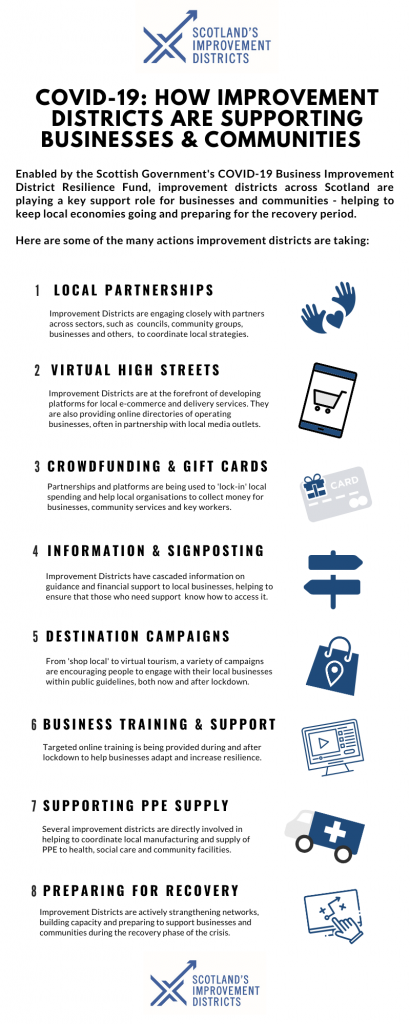Professor Leigh Sparks, Professor of Retail Studies, Institute of Retail Studies, University of Stirling
In any normal year, we would be meeting at this time in Holyrood for the Annual Parliamentary Reception for the Cross Party Group on Towns and Town Centres. This of course is no normal year. The event is instead being held online tonight (3rd November, details and registration via the link) and its focus is on the work of Scotland’s Improvement Districts in supporting local business and encouraging the public to safely use their local services. As the infographic below shows, they are using many approaches to meet these local needs.

The event, Chaired by John Scott MSP (the Convenor of the Cross Party Group) will hear about Scotland Loves Local (Phil Prentice), the Local Focus and National Impact of Improvement Districts (Alison Evison and Roddy Smith) and then a Ministerial Address from Aileen Campbell MSP, Cabinet Secretary for Communities and Local Government.
Lowering the tone and quality I will then provide closing remarks. In trying to think what I could say, I was conscious that I could not do justice the many excellent local activities of the Improvement Districts at this time, so my remarks will be general. The news section of Scotland’s Improvement Districts website however provides many good examples of the local work that has been undertaken.
I intend to talk around the following:
The Scottish Government through these challenging times has provided direct funding of Improvement Districts, the ability to extend renewals via the emergency Coronavirus Legislation, Towns and BIDs Recovery Funding, Town Centre Capital Fund and the Scotland Loves Local campaign and funding support. Whilst the pandemic continues to present major issues in all aspects of our society and economy, the leadership, solidarity and support demonstrated by Scotland’s Improvement Districts, and enabled by Scottish Government, has been commendable from the outset.
The Scottish Government’s BIDs Resilience funding in March allowed us to ask BIDs to pivot from “business as usual” to create hyper local support structures. BIDs have since performed a range of vital activities to help businesses navigate their way through the complexities of Grant funds, Job Retention, Loan Funds and VAT and Tax deferrals. They have delivered PPE infrastructure, Marketing and On line platforms and either led or actively participated on local Resilience partnerships to focus on vulnerability. Their selfless efforts extended well beyond their levy paying memberships to help surrounding towns and settlements.
This local leadership, knowledge and agility has all underlined just how important Improvement Districts are to their local communities. A source of real encouragement has been the renewed positivity in the relationships between BIDs and Local Government – they agreed local responses and effectively delivered and indeed continue to deliver these across the country.
Looking forwards, the next few months will be challenging but the solidarity and resilience shown by Scotland’s Improvement Districts throughout the year will no doubt help to see us through. The Scottish Government has just awarded the second round of BIDs Recovery funds to help maintain the momentum behind a safe and gradual reopening and our local recovery.
We have a national campaign building on localism, sustainability and community wealth – I would encourage all our cities, towns, improvements districts and neighbourhoods to back the Scotland Loves Local call to action, your support will help build a stronger and faster economic and social recovery.
We can extend the Improvement District concept even further – we already have a successful model for towns and cities, there are Digital, Food and Drink and Tourism Improvement Districts. Our focus will increasingly also be on creating more community focused improvement districts, a model which embraces businesses, communities and local stakeholders working together to develop and implement consensual visions and activities.
Looking beyond the pandemic, we need to renew our vision for a more sustainable and equitable Scotland. The Programme for Government has set some ambitious goals, a greener and fairer economy, the wellbeing economy, more social ownership, opportunities around housing, energy and digital to create better places for everyone, the 20 minute neighbourhood concept – Scotland’s Improvement Districts will be part of this ambition and will continue to support their local communities beyond the current crisis.
This post first appeared on the Stirling Retail blog, on 3 November 2020.
